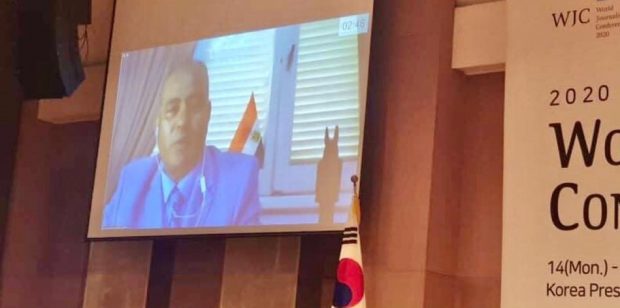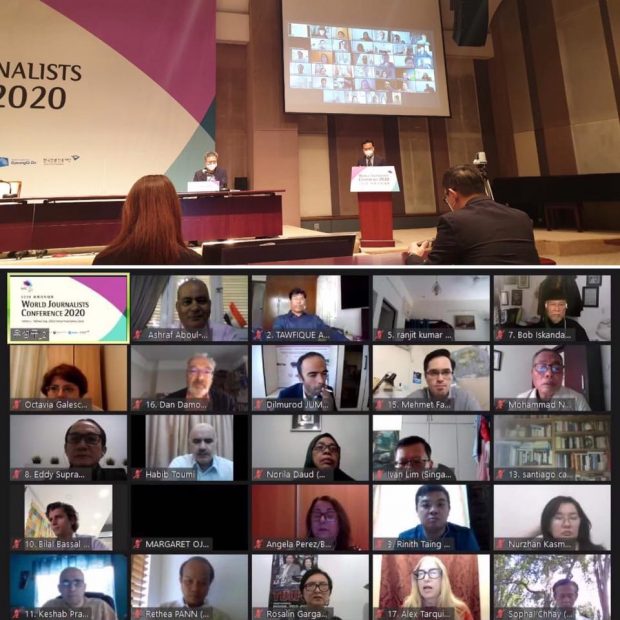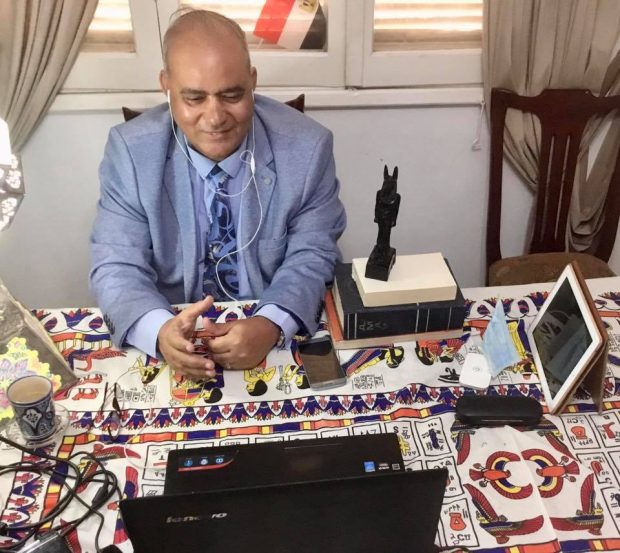Fake News & the Future of Journalism: Al Jazeera Channel – a case study

Ashraf addressing the participants in WJC 2020
Ashraf Aboul-Yazid Dali, Egypt
President, Asia Journalists Association
President, The Silk Road Literature Series
CAIRO: This year’s World Journalists Conference (WJC 2020), held online due to travel restrictions imposed by COVID-19, was a good opportunity to highlight how fake news not only meant posting, publishing or broadcasting fake news, misinformation and disinformation, but also hiding facts and truth.
Below is my speech on the first day of the conference on September 14-16. The second day focused on global responses to COVID-19 and the third day was devoted to discussing peace policy on the Korean Peninsula as it marked the 70th anniversary of the Korean War.
“Fake news started to be criticized on a large scale after the spread of supporting social media platforms.
While media has been connected with fake news and silly propaganda since the launch of newspapers and the broadcasting of radio stations and TV channels; the help of Facebook, Twitter, and other social media platforms, created a huge focus on them.
Fake news has become no longer restricted to its original sources, because the new platforms easily available in all hands were able to intensify their spread in an unprecedented way.
When Al Jazeera Media Network was launched in November 1996, it had a very famous slogan to identify itself: “The Opinion and The Other Opinion”, meaning all sides to a story or debate will be covered by the station. However, this simple and basic line as the core of the message is not respected by Al Jazeera Media Network.
Fake news does not mean publishing wrong facts alone; they also mean hiding the correct ones, as well.
Al Jazeera Media Network is a news channel for public benefit under Qatari law. Under this structure, Al Jazeera Media Network receives funding from the government of Qatar. But this funding has a price that made Al Jazeera lose its independence. Al Jazeera kept following the guidelines applied by the Qatari owner.
After the political upheavals of the Arab Spring, Al Jazeera aligned itself with Islamist political parties such as Egypt’ s Muslim Brotherhood, and other radical Islamists when backing Islamist fighters in rebellions that took place in Syria and Libya.
Then came the moment of truth; when the Gulf States designated those political Islamist groups as working against the political regimes inside the Gulf itself.
To their surprise, it was revealed that Qatar, with help of Al Jazeera’s presence, paid a huge amount of money, besides sending critical information to the military in Yemen that caused the fatalities of many UAE fighters and Saudi soldiers in Yemen.
Eventually, four countries moved to respond, Saudi Arabia, UAE, Bahrain and Egypt, to stop the financial and media wars led by Qatar against them.
In addition to stopping support to Hamas (the Palestinian resistance movement) and Muslim Brotherhood, expulsing their members from Qatar, the four countries were clear to ask for ceasing the broadcast of Al Jazeera news channel, which was considered the strong hand of Qatar to interfere in the political and economic scene in the region.

From the conference
One of the many journalists who quit Al Jazeera, Aktham Suliman, told DW in Berlin: “We suddenly found ourselves in a situation in which our reporting was precisely aligned with Qatari foreign policy.”
It could be right to follow Qatari foreign policy and tell the truth in the same time, but the opposite did happen.
Al Jazeera was found to be wholly deceptive and journalistically unprofessional in a report published by Al Ahram, Egypt. After the collapse of the Egyptian regime, 22 members of staff of Al Jazeera’s Egyptian bureau announced their resignation on July 8, 2013, citing “biased” coverage of the ongoing Egyptian power redistribution in favor of the Muslim Brotherhood.
In September 2013, a court in Cairo ordered Al Jazeera to stop broadcasting in Egypt, claiming it was “inciting violence that led to the deaths of Egyptians.”
Late videos discovered confirmed how Al Jazeera used to fabricate fake videos to mislead their viewers.
The fake news does not come from Al Jazeera directly only; they can also be generated by its members on social media.
After the catastrophic explosion at the Port of Beirut, Ahmed Mansour, the most famous Egyptian journalist of Al Jazeera, claimed that Beirut silos were built by the Ottomans more than 150 years ago and that is the reason why they could withstand the explosion and did not collapse
This was one of the fake news series, as Kuwait financed the grain silos project in the port of Beirut by a loan agreement between the Fund for Arab Economic Development and Lebanon that was approved in accordance with the March 16, 1970 law.
Al Jazeera staff journalists do not follow any line of professionalism in doing their job, as long as fake news is ready to support their mission.
For the sake of journalism in the future, we need giant news networks, but we need them to be honest and to stop fake news.

Ashraf giving his speech on fake news, citing Al Jazzera in his case study
There are two ways to stop fake news; the technological one – by stopping the availability of their resources and platforms, but this is, somehow, the dictatorship school applied currently in the region.
The other way is to create alternatives. They could be technological alternatives, by sending users to live in other news spaces via VR glasses. We can also defeat all fake news platforms by blacklisting them.
But I believe that the most effective way in journalism is to be transparent, honest, trusted. When people trust you, they will not follow your opposite.”



















































